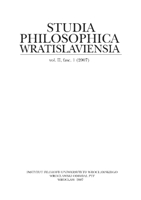Utracona całość. Problem rozczłonkowania w Alasdaire’a MacIntyre’a krytyce kultury nowoczesnej
Wholeness Well Lost. The Problem of Compartmentalization in MacIntyrean Critique of Modernity
Author(s): Witold M. NowakSubject(s): Philosophy
Published by: Wydawnictwo Uniwersytetu Wrocławskiego
Keywords: Alasdair MacIntyre
Summary/Abstract: Alasdair MacIntyre, often classified as a communitarian, is one of the most radical critics of modernity, modern liberalism and the Enlightenment project. A crucial concept and leitmotiv of his critique is the concept of compartmentalization. In After Virtue and other works MacIntyre develops an idea that a malaise of modern civilization (its practices, presuppositions, institutions, and especially its public moral discourse) is the lack of one hypergood (which liberals approvingly call ‘pluralism’). In consequence, the modern individual has no moral identity and his/her life is only a series of episodes with no unifying element. An essential part of MacIntyrean critique of modernity is his historical narration in which he contrasts the modern and contemporary situation with the heroic and classical antiquity and the Middle Ages. In this comparison we may see, as MacIntyre says, that history of modern morality is the history of drama which culminates in contemporary new barbarism and its heroes (characters): Manager, Rich Aesthete and Therapist. MacIntyre is not only a critic of modern societies; he also proposes some remedies to maladies of modern civilisation. His proposition, deeply rooted in Aristotelian-Thomistic philosophy, is the return to Tradition as a kind of moral inquiry and a kind of life. In times of technocratic barbarism we must turn back to cultivating practices with their own goods and virtues and to the concept of the unity of human life.
Journal: Studia Philosophica Wratislaviensia
- Issue Year: II/2007
- Issue No: 2
- Page Range: 26-44
- Page Count: 20
- Language: Polish

